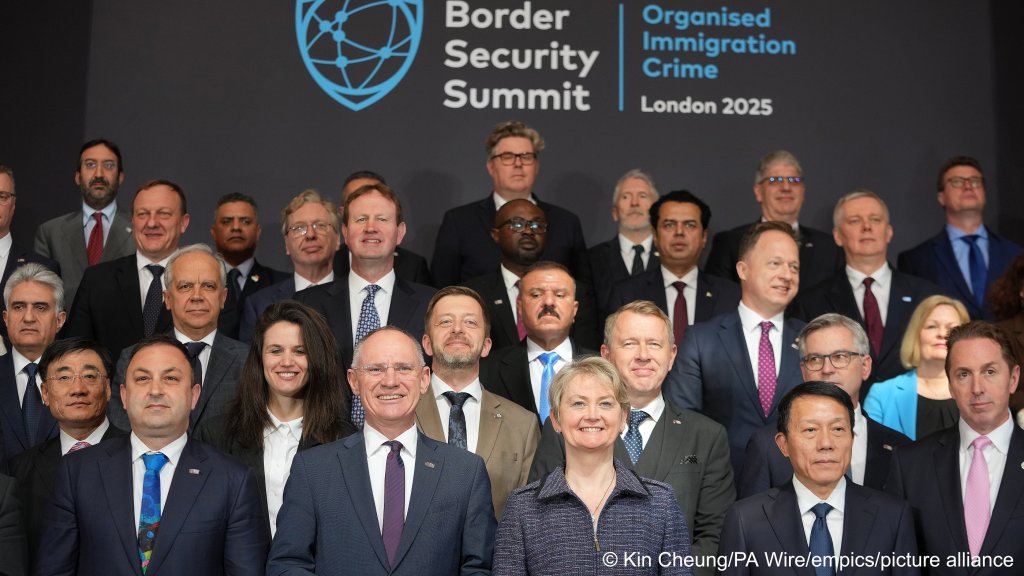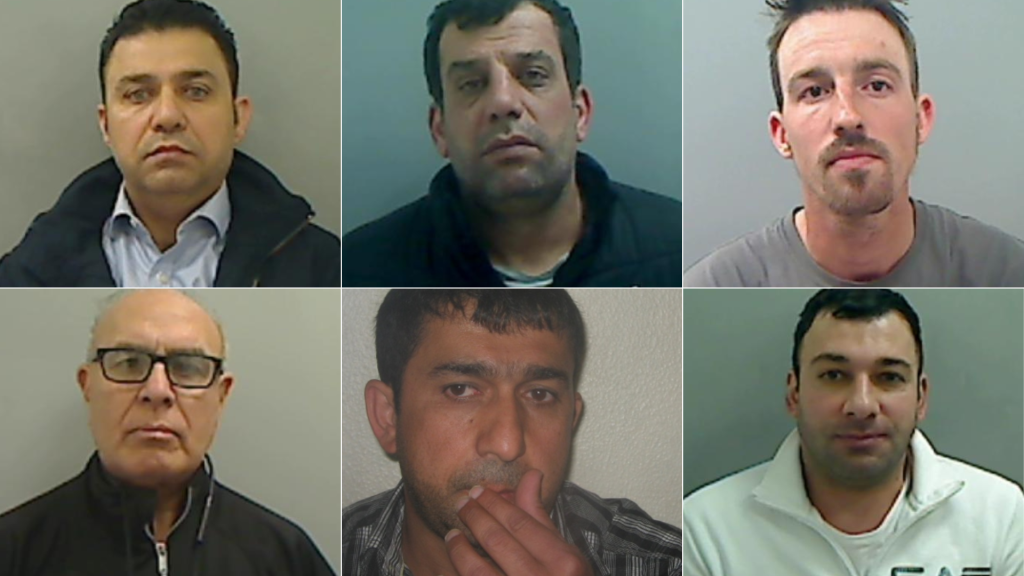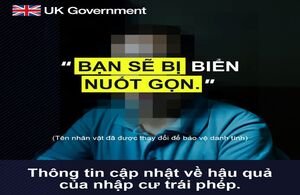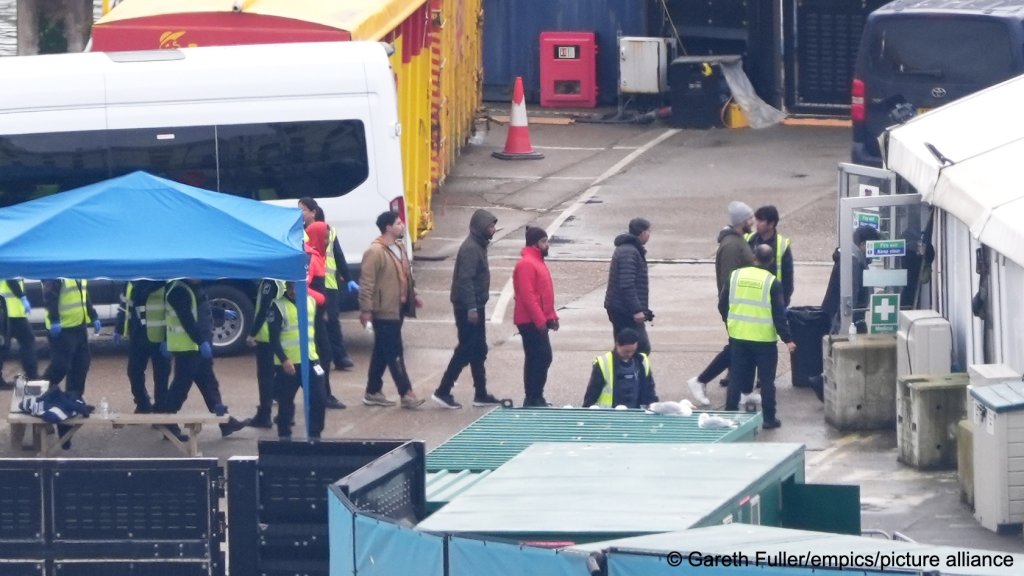On Monday the UK invited over 40 countries and organizations to take part in what the government describes as an "unprecedented global fight against ruthless people smuggling gangs." Representatives from Meta, X and TikTok were also present to try and work out ways of tackling the promotion of smugglers' routes on social media.
"I simply do not believe organized immigration crime cannot be tackled," said Britain’s Prime Minister Keir Starmer, as he opened a summit in London on Monday (March 31) aimed at coordinating efforts to fight people smuggling and irregular migration.
Over 40 countries and organizations were involved in the summit, including representatives from three of the biggest social media platforms in the world, Meta, X and TikTok.

'Combine resources'
Participants vowed to work together closely to tackle people smuggling. In the past, Starmer claimed that smugglers had been given an "open invitation" to send migrants to the UK because the police and intelligence agencies were not working together enough, reported dpa.
"We've got to combine our resources, share intelligence and tactics, and tackle the problem upstream at every step of the people smuggling routes," Starmer said in a press release from the UK government.
Germany's outgoing Interior Minister Nancy Faeser called on partner countries to exchange information "to uncover and dismantle the entire logistics chain behind the smuggling operations."
"Smuggler and trafficking gangs make their money crossing borders, so law enforcement needs to work together across borders to bring them down. Only a coordinated international response, across the whole irregular migration route, can effectively dismantle these networks," added Britain’s Home Secretary Yvette Cooper.
Spain's Interior Minister Ferdinando Grande-Marlaska underlined that Spain was concentrating "all its efforts on working with countries of origin and transit." Governments, continued the Spanish minister, "need to use the most innovative technology...to combat the smuggling mafias ...and prevent the loss of life," that occurs on all smuggling routes, EFE reported.
'We are boosting enforcement, with a new border security command'
Starmer said that international people smuggling was "a massive driver of global insecurity." He added that it undermined the government’s ability to control who is allowed into the UK and it made British people "angry." Starmer added, "it makes me angry, frankly, because it’s unfair on ordinary working people who pay the price -- from the cost of hotels, to our public services struggling under the strain."
Starmer added that it was also unfair on "illegal migrants themselves, because these are vulnerable people being ruthlessly exploited by vile gangs."
At the summit, the UK government announced that they had committed over 30 million pounds (around 35 million euros) "to take down criminal gangs," as well as increased funding to prosecute more smugglers and were strengthening international cooperation.
Keir Starmer recorded a video message posted to social media directly for the smugglers. In it he said his government was:
"Breaking your business model, and leaving you nowhere to hide. We are working with law enforcement partners across the world, to freeze your assets, to ban your travel and put you behind bars. When I was this country’s chief prosecutor, I locked up terrorists who planned to blow up planes crossing the Atlantic. Now, I am going after the criminals who put people on small boats across the Channel. We are boosting enforcement, with a new border security command. We are giving the police more power to stop smugglers in their tracks, and we are making sure no one can profit from this vile trade."
The role of social media
A part of the summit focused on the role social media companies allegedly play in the promotion of smuggling routes and smugglers’ services.
In January this year, Britain’s National Crime Agency (NCA) announced that its referrals to social media companies had led to a 40 percent increase in takedowns of accounts linked to people smuggling in 2024.
The NCA stated that it began this strategy in late 2021, working with four major social media platforms. By January this year, they reported that their efforts had resulted in the removal of more than 16,500 accounts over three years.
"Among those removed are posts falsely promoting small boat crossings from France to the UK as being via speedboat," stated the NCA. It added that "posts offering prizes to migrants who refer a friend, accounts offering transport from Africa to southern Europe and posts offering fake ID documents for sale" were also targeted and removed.
Read AlsoChannel: Britain and France sign another 'road map' amid increase in migrant arrivals to UK
Investigations and convictions
The NCA said they had also "conducted a number of investigations targeting individuals or groups using social media to promote their services." Some of these investigations have led to convictions. In November 2024, Amanj Z from Preston was jailed for 17 years, stated the NCA, after using video testimonials of those he had successfully smuggled to entice others to pay him for his services.

"Social media remains a key way the organized crime groups involved in people smuggling promote their illegal services to migrants. It is a major part of their business model," stated Sophie Austin, Operations Manager at the NCA’s Online Communication Center.
"Once migrants are engaged, they then move conversations onto encrypted messaging apps where they are hidden from law enforcement."
Austin explained that "taking down these accounts disrupts the activities of those criminal networks." She said the NCA was increasingly devoting resources to this kind of work and was working in partnership with the social media platforms to highlight the content and develop more detection capabilities.
Read AlsoEuropol dismantles networks suspected of smuggling migrants
TikTok videos with 'joyous music' act as promotions
Recently, an article in the right-wing British newspaper Telegraph claimed that smugglers were offering migrants cheaper journeys across the Channel in return for them filming footage on the boats to try and demonstrate how 'easy' the crossing is.
"Migrants are encouraged to film the journeys and then post them on TikTok, Snapchat, Instagram and Facebook in order to lure others into making the dangerous crossings," claimed the Telegraph on March 20. Similar claims were made on other right-wing news sites like GB News and the Daily Mail.
The newspaper highlighted a TikTok channel allegedly run by a man from Afghanistan, which showed footage of a small boat crossing the Channel wit a Union Jack flag and a finger pointing in the direction of the UK. The account appears to have since been taken down.
According to the Telegraph, smugglers tend to charge between 1,500 and 6,000 pounds (around 1,792 euros to 7,171 euros) to cross the Channel, if a migrant were to agree to film the journey and post it, they could expect a discount from between 1,000 to 2,000 pounds, (between about 1,195 and 2,390 euros) claims the newspaper.

An unnamed "immigration source," reportedly told the Telegraph "the smugglers are getting more and more professional in their approach. There is also more competition than ever, so they have to stay one step ahead. They are making their adverts as professional as they can. That includes making crossings look as safe and peaceful as possible. But in reality, they are dangerous."
A spokesperson for the UK’s Home Office (Interior Ministry) told the Telegraph, "the people-smuggling gangs do not care if the vulnerable people they exploit live or die, as long as they pay. We will stop at nothing to dismantle their business models and bring them to justice."
Read AlsoUK to roll out new sanctions to go after smuggler networks and manufacturers of boats
'Major arrests'
Announced ahead of the summit, the UK unveiled the "major arrests of smuggling kingpins," including arrests linked to a major Syrian organized crime group responsible for smuggling at least 750 migrants into the UK and Europe, the arrest of a Turkish national suspected of being a huge supplier of small boats, the conviction of two men in Wales who ran a smuggling ring moving thousands of migrants across Europe as well as the arrests of six men in February, wanted in Belgium, "over their suspected involvement in a major people smuggling ring."
A collaboration between the NCA and the Kurdish authorities in the Kurdistan region of Iraq has reportedly facilitated the arrests of three men who are suspected of being linked to a Kurdish people smuggling organized crime group, "as well as an increase in the takedown of social media accounts linked to people smugglers."
The summit was called at a time when the UK recorded the greatest number of arrivals in the first three months of the year since records of small boat Channel crossings began in 2018. Despite these figures, the Prime Minister still insisted that his combined approach to tackling people smuggling was "starting to bear fruit," reported dpa.
Read AlsoThree suspected smugglers arrested in Iraqi Kurdistan as UK and Iraq sign new migrant return deal

Tackle supply and demand together for success, suggests new study
In a recent study, the Mixed Migration Centre, based in Geneva, wrote that while law enforcement was needed to crack down on smuggling, any migration strategy needed to tackle the demand as well as just trying to block entry points into Europe.
Roberto Forin, the head of the MMC’s Europe program, told InfoMigrants that solely pursuing restrictive policies could just lead to more attempts to circumvent the blocks. “Smuggling networks,” writes the MMC, "are agile and adaptable, deploying new strategies to circumvent counter-smuggling initiatives instead of extinguishing supply, stricter policies, particularly on the Central Mediterranean route, English Channel and Atlantic routes, have resulted in increasingly adaptive and professionalized smuggler operations."
"If you do nothing to address the demand, but just constantly try and cut the head off the snake, there will probably be another snake coming," says Forin, using an analogy.
Forin and his team feel that for a long-term solution to the problem, European states need to begin offering more legal routes into the country and implement a mixed approach. Law enforcement mixed with incentives to stay in countries of origin, or en route, as well as legitimate pathways to arriving in Europe.
